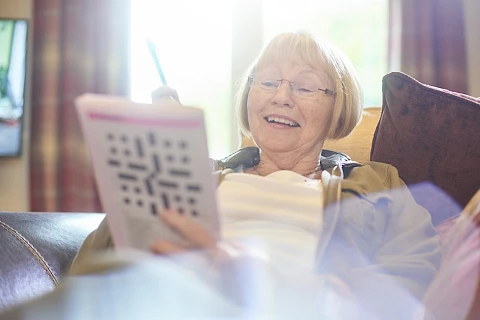
Cognitive health helps us maintain independence and quality of life in our senior years. It involves the brain's ability to think, learn, and remember. However, winter can pose challenges to mental well-being for seniors. The cold and often gloomy days can lead to reduced physical activity and social interaction, potentially impacting cognitive health. Do what you can to support seniors' mental and emotional needs, especially during winter.
Cognitive Health in Seniors
Cognitive health is about keeping the mind sharp and alert as we age. It's necessary for problem-solving, memory, and day-to-day decision making. For seniors, maintaining cognitive health is beneficial for preserving independence and overall happiness. During winter, seniors might face cognitive challenges due to staying indoors more and engaging less in stimulating activities. These challenges can make it difficult for them to maintain their mental acuity.
Engaging Memory Games
Memory games are excellent tools for cognitive stimulation. They help exercise the brain by challenging it to recall and recognize things, essential skills for maintaining memory. Popular memory games for seniors include classics like "Concentration," where players must remember the location of matching pairs of cards. "Simon," a game of remembering sequences, is also beneficial. To incorporate memory games into daily routines, set aside a specific time each day for playing them. This can become a fun and anticipated part of the day for both seniors and their caregivers or family.
Puzzles for Mental Exercise
Puzzles are another fantastic way to keep the mind engaged. They come in various forms such as crosswords, Sudoku, and jigsaw puzzles. These activities enhance problem-solving skills and boost memory. For seniors, starting with simpler crosswords or Sudoku puzzles might be best, gradually moving to more challenging ones as they get comfortable. Jigsaw puzzles can be particularly rewarding, offering a hands-on experience that requires attention to detail and patience. Choosing the right difficulty level ensures that the puzzles are challenging yet not frustrating, encouraging regular engagement.
Creative Projects for Brain Stimulation
Creativity also boosts cognitive health. Engaging in creative projects can keep the brain active and improve mood. Seniors might enjoy painting, which allows them to express themselves through art. Knitting is another option, promoting focus and hand-eye coordination, while writing provides an opportunity to explore stories, both real and imagined. Supporting seniors in trying new hobbies can rekindle their passion for learning, keeping their minds sharp and spirits high.
Fostering Engaging Conversations
Social interaction is also beneficial for cognitive health, and conversations are a big part of this. Talking with others stimulates the brain, encouraging it to work harder and stay active. Caregivers can use conversation starters to engage seniors, such as asking about their favorite childhood memories or discussing current events. Active listening is helpful, showing genuine interest and encouraging seniors to share their stories. This not only supports cognitive health but also strengthens social bonds.
Boost Brain Health With the Help of Senior Helpers Smithtown
Supporting senior brain health during winter is not only about keeping them mentally sharp but also about ensuring they lead fulfilling lives. By incorporating memory games, puzzles, creative projects, and engaging conversations into their daily routines, caregivers can make a significant difference. These activities are both enjoyable and designed to combat the cognitive challenges brought on by the cold, isolation of winter.
At Senior Helpers Smithtown, we're committed to providing personalized care that prioritizes cognitive well-being. We invite caregivers and families to contact us for support in Smithtown, Central Islip, Port Jefferson, Centereach, and Stony Brook. Let's work together to ensure our seniors continue to thrive, even in the chill of winter.